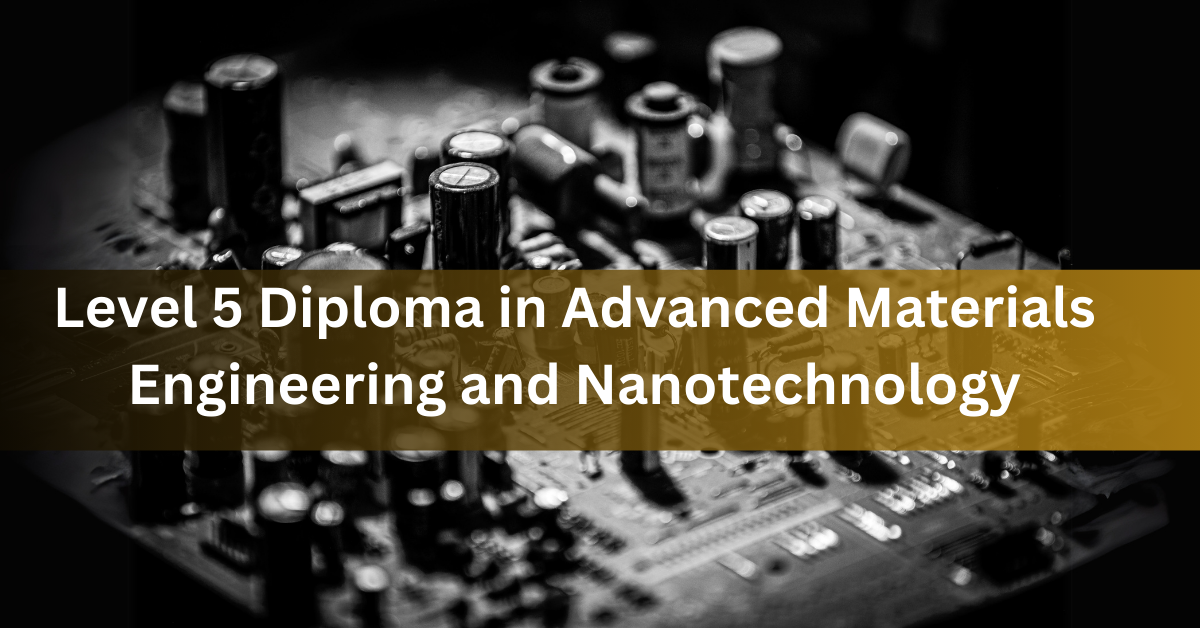
Level 5 Diploma in Advanced Materials Engineering and Nanotechnology
- Master advanced concepts in materials science and nanotechnology.
- Learn to design and analyze innovative materials for industrial and scientific applications.
- Gain hands-on experience with state-of-the-art tools and technologies.
- Develop skills for solving complex engineering challenges in diverse industries.
- Enhance your career prospects with a globally recognized qualification.
- Understand the properties and applications of advanced engineering materials.
- Analyze and synthesize nanostructures for specific applications.
- Explore advanced manufacturing techniques, including additive and subtractive processes.
- Conduct performance testing and optimization of materials.
- Apply nanotechnology principles to address real-world challenges in engineering and technology.
- Fundamentals of Materials Science
- Properties, classifications, and behavior of engineering materials.
- Microstructure-property relationships in metals, polymers, and ceramics.
- Nanotechnology Principles and Applications
- Introduction to nanoscale science and engineering.
- Techniques for the synthesis and characterization of nanomaterials.
- Advanced Manufacturing Techniques
- Additive manufacturing (3D printing) and nanofabrication methods.
- Advanced machining and coating technologies.
- Material Performance and Testing
- Methods for testing mechanical, thermal, and electrical properties.
- Techniques for failure analysis and durability assessment.
- Applications of Advanced Materials
- Use of smart materials, composites, and nanostructures in industries.
- Case studies in aerospace, biomedical, and electronic applications.
- Sustainability in Materials Engineering
- Recycling and lifecycle analysis of materials.
- Environmental impact of material production and nanotechnology.
- Research and Development in Nanotechnology
- Emerging trends in nanotechnology and advanced materials.
- Developing solutions to engineering challenges using R&D methodologies.
- Materials Engineer
- Nanotechnology Specialist
- Product Development Engineer
- R&D Engineer in Advanced Materials
- Quality Assurance Engineer
- Level 6 qualifications in Materials Science or Nanotechnology.
- Bachelor’s or Master’s degree programs in Materials Engineering, Nanotechnology, or related fields.
- Innovative Curriculum: Designed to address the latest advancements in materials science and nanotechnology.
- Practical Experience: Hands-on training with advanced tools and equipment.
- Expert Faculty: Learn from experienced professionals and researchers in the field.
- Recognized Qualification: Enhance your career with an accredited and industry-relevant diploma.
- Flexible Learning Options: Study at your own pace with online, part-time, or full-time options.
Study Units
- Fundamentals of Materials Science
- Properties, classifications, and behavior of engineering materials.
- Microstructure-property relationships in metals, polymers, and ceramics.
- Nanotechnology Principles and Applications
- Introduction to nanoscale science and engineering.
- Techniques for the synthesis and characterization of nanomaterials.
- Advanced Manufacturing Techniques
- Additive manufacturing (3D printing) and nanofabrication methods.
- Advanced machining and coating technologies.
- Material Performance and Testing
- Methods for testing mechanical, thermal, and electrical properties.
- Techniques for failure analysis and durability assessment.
- Applications of Advanced Materials
- Use of smart materials, composites, and nanostructures in industries.
- Case studies in aerospace, biomedical, and electronic applications.
- Sustainability in Materials Engineering
- Recycling and lifecycle analysis of materials.
- Environmental impact of material production and nanotechnology.
- Research and Development in Nanotechnology
- Emerging trends in nanotechnology and advanced materials.
- Developing solutions to engineering challenges using R&D methodologies.
By completing this diploma, learners will:
- Understand the properties and applications of advanced engineering materials.
- Analyze and synthesize nanostructures for specific applications.
- Explore advanced manufacturing techniques, including additive and subtractive processes.
- Conduct performance testing and optimization of materials.
- Apply nanotechnology principles to address real-world challenges in engineering and technology.
This course is designed for:
Aspiring Materials Engineers
Individuals seeking to specialize in materials science, with a focus on advanced materials and nanotechnology applications.
Nanotechnology Enthusiasts
Those interested in the emerging field of nanotechnology and looking to gain expertise in nanoscale engineering, design, and application.
Product Development Engineers
Professionals involved in designing innovative products who want to deepen their knowledge of advanced materials and nanotechnology to enhance product performance.
R&D Engineers in Advanced Materials
Researchers and engineers working in research and development who are looking to specialize in materials science and nanotechnology for cutting-edge applications.
Aerospace, Healthcare, and Electronics Engineers
Professionals in industries such as aerospace, healthcare, electronics, or renewable energy who want to apply advanced materials and nanotechnology to develop new solutions.
Quality Assurance Engineers
Individuals responsible for testing and ensuring the quality of advanced materials and nanotechnology products.
Career Changers from Related Engineering Fields
Professionals from other branches of engineering (e.g., mechanical, civil, chemical) seeking to transition into the growing fields of materials science and nanotechnology.
Those Preparing for Advanced Studies
Learners looking to pursue Level 6 qualifications or higher academic programs in Materials Engineering, Nanotechnology, or related fields.
Our assessment process is designed to ensure every learner achieves the required level of knowledge, skills, and understanding outlined in each course unit.
Purpose of Assessment
Assessment helps measure how well a learner has met the learning outcomes. It ensures consistency, quality, and fairness across all learners.
What Learners Need to Do
Learners must provide clear evidence that shows they have met all the learning outcomes and assessment criteria for each unit. This evidence can take different forms depending on the course and type of learning.
Types of Acceptable Evidence
Assignments, reports, or projects
Worksheets or written tasks
Portfolios of practical work
Answers to oral or written questions
Test or exam papers
Understanding the Structure
Learning outcomes explain what learners should know, understand, or be able to do.
Assessment criteria set the standard learners must meet to achieve each learning outcome.
Assessment Guidelines
All assessment must be authentic, current, and relevant to the unit.
Evidence must match each assessment criterion clearly.
Plagiarism or copied work is not accepted.
All learners must complete assessments within the given timelines.
Where applicable, assessments may be reviewed or verified by internal or external quality assurers.
Full learning outcomes and assessment criteria for each qualification are available from page 8 of the course handbook.
Top Courses
Related Courses
Let's Get in touch
Deleting Course Review
Course Access
This course is password protected. To access it please enter your password below:



